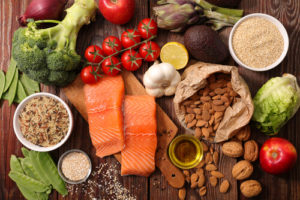
Recovery is more than just focusing on a specific concern (for example, a mental illness, addiction or both) – it’s about improving all the aspects of your life so that you are ultimately able to live happier and healthier. Both addiction and mental illness can take a significant toll on your body’s functioning and energy. Substances can make you dehydrated, and some drugs can take away feelings of hunger – which place your body’s nutritional balance at an all-time low. Mental illness can be perpetuated by unhealthy foods and can make it hard to want to practice good nutritional practices in the first place. One aspect that will become increasingly important to you throughout your recovery is nutrition, and this is because it affects nearly every aspect of life.
A 2017 study published in the Journal of Traditional Medicine and Clinical Naturopathy emphasized that nutrients are what help our mind and body function at its best. When we’re missing vital nutrients and minerals, we’re more likely to become overweight, to feel lethargic, to be in a bad mood, to have difficulty with critical thinking and more. The study lists a few food sources that can be excellent for your recovery, such as a Mediterranean diet, which consists mostly of:
- Plants
- Fruits and vegetables
- Whole grains
- Nuts
- Omega 3 fatty acids
Nutrition is more about creating a lifestyle rather than just eating what you want, when you want it. You have to think in terms of what food is going to give your mind and body the energy it needs to function at its best. Recovery is a critical time to regain some of the strength and energy lost from mental illness or addiction, and a healthy diet will help move everything along more smoothly. Other studies have shown that eating a diet rich in protein, carbohydrates, essential fats (like fish and nuts), water and more can also help lessen the intensity of withdrawal symptoms, which can become quite painful/uncomfortable.
The Australian Drug Foundation even notes foods that can aid in a better mood, such as: seafood, tofu, oats, sardines, lentils and turkey, and foods that may help prevent relapse, such as: salmon, anchovies, avocado, spinach and more. Some recovery centers, especially those that utilize a holistic approach, may even provide a dietitian that can help a person identify some nutritional areas of improvement in their life.
Cumberland Heights is a nonprofit alcohol and drug-addiction treatment center located on the banks of the Cumberland river in Nashville, Tennessee. On a sprawling 177-acre campus, we are made up of 2 12-Step immersion campuses, 12 outpatient recovery centers and 4 sober living homes. We believe that each person has a unique story to tell – and that’s why we always put the patient first.
Call us today at 1-800-646-9998 to take the next step towards your happiness and health.










